Sochi 2014: One year countdown to Winter Olympics start
- Published
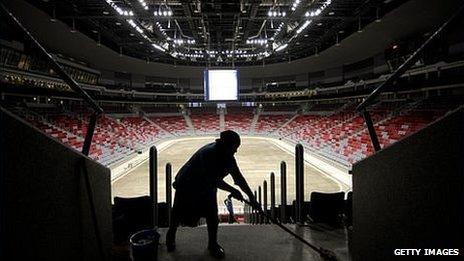
Organisers say construction work has finished on the Sochi sporting venues
London 2012 may be starting to dim in the memory, but the Olympic caravan moves on and it is now just one year until the opening of the 2014 Winter Games.
Taking place in the Russian Black Sea city of Sochi, organisers say that not only are preparations on track but that the event will introduce some important "firsts" to the country.
These include better access for and acceptance of people with disability, greener standards of construction, and the growth of a volunteer programme in a country not known for this sector.
In addition a university campus is being built in Sochi, which will also host a new Russian Formula 1 racing circuit. And on more hard-nosed aspects such as raising revenues to stage and host the Games, 2014 Winter Olympics chief executive Dmitry Chernyshenko is also upbeat.
"We have physically finished the venues," he says. "Our schedule is on track and on time. We are now entering a critical period of testing our operational readiness."
Test events
A new Olympic Park - which Mr Chernyshenko says will get its final "beautification work" this October - has been built by the Black Sea coast in the Imeretin Valley, with 11 venues divided between two clusters, one coastal and one mountainside.
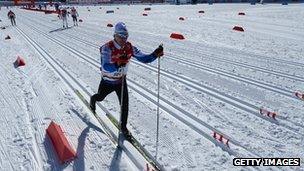
A number of world-rated winter sport test events are taking place in Sochi in 2012-13
During the 2012-13 season, some 21 international test events in all 15 Olympic disciplines and in five Paralympic sports are taking place, including the ski jumping World Cup last December.
Apart from the stadiums, work is still taking place on other infrastructure such as connecting roads for venues, hotels, and shopping areas.
Meanwhile energy giant Gazprom - which opted to sponsor the 2018 World Cup rather than Sochi games - has opened a combined heat and power station for Sochi, to provide "secure uninterrupted electricity and heat supplies to sports and tourist infrastructure".
And a high-speed rail link is being constructed to to connect sites at sea-level with those in the mountains, where Games skiing events will be held.
"We are using the Sochi Games as an accelerator for the region," says Mr Chernyshenko, adding environmentally friendly building standards have been introduced to Russia thanks to Games construction work.
"It is the first time in Russian history - this standard did not exist before," he says.
"The games is a catalyst - we are concerned about protecting and improving the environment. This will be one of the Games's legacies."
Leopard programme
There have been protests from environmentalists who have said that the effect of the extensive building work in the area has been to destroy rare natural habitats.
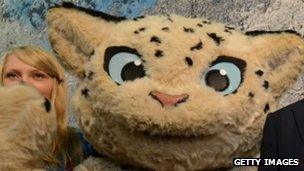
There is a programme to reintroduce the endangered snow leopard back into the region
However, since a critical UN report in 2010 organisers have produced an extensive "green" programme for Sochi 2014, including carbon neutral construction, environmental education, and a plan to reintroduce the endangered snow leopard back into the region.
Indeed, the leopard is one of three mascots, which - with other souvenir products - has seen more than $120m brought in to date through a merchandising licensing programme.
Licensed goods and services are currently available in 500 outlets, and by the time the Games begin it is hoped to have 5,000 branded goods in 8,000 outlets across Russia, with retail sales volume expected to reach a Winter Games record.
And the money is needed, with a recent estimate putting the cost to Russia of the Sochi Games above $50bn (£32bn), exceeding even that of the 2008 Beijing Olympics, due to nearly all of the infrastructure being built from scratch.
Over the past year, Games organisers have signed up 10 more commercial partners, with some $2bn having now been taken from this sponsorship programme.
"It has been most successful marketing programme in the history of the games," says Mr Chernyshenko.
"We are creating opportunities for our partners, who are generating significant return on their investment."
New laws
One of the less-welcome aspects is other businesses trying to profit from the Games coming to Sochi by pushing up prices for services.
But Mr Chernyshenko says: "We are committed to providing affordable accommodation for all the visitors during the games.
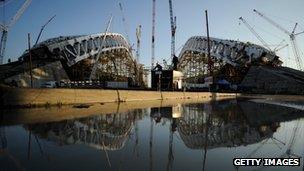
The Fisht stadium will host the opening and closing ceremonies of the 2014 Winter Games
"There have been new laws adopted against scalping on prices."
He says that there are caps in place, for example a one-night stay in a three-star hotel should be about $100 a night.
"They should not be trying to create extra profits when they are benefitting from the advanced infrastructure such as new roads."
The Games are also being used to kick-start other high-profile events in Russia, and more particularly Sochi. The Fisht Olympic Stadium, in the new Sochi Olympic Park, will be used to host the opening and closing ceremonies.
It will then become a a venue for Russia's hosting of the 2018 football World Cup,
Meanwhile, Sochi says it is still on track to host a Formula 1 Grand Prix in October 2014, with F1 supremo Bernie Ecclestone saying on a visit to the city this week that "everything seems to be good" in terms of preparations.
'Model city'
On Thursday, some other big names will be in town to mark one year to the start of the games, including Russian President Vladimir Putin and International Olympic Committee (IOC) president, Jacques Rogge, as well as the mission chiefs of 70 of the national Olympic committees.
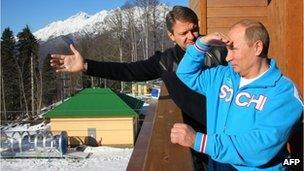
Russian President Vladimir Putin says Sochi could be a potential venue for a future G8 summit
As well as the handshaking, they will also be checking on progress.
"What we have learned from London 2012 is to plan everything well in advance," says Mr Chernyshenko, who used to work in advertising. "Training people properly, testing and rehearsing, and hence reducing risk."
However he is as enthused by what might be seen as the "softer" legacies, including the Games preparations being a launch-pad for the Russian Olympic University, which this year launches its first postgraduate sports course, the master of sport administration.
And he is proud of the new standards of access in the Olympic city for people with disabilities.
"We will be welcoming several thousands of people with disabilities, and are creating a positive shift in mentality among Russian people.
"We are also creating Sochi as a model city for others to copy."